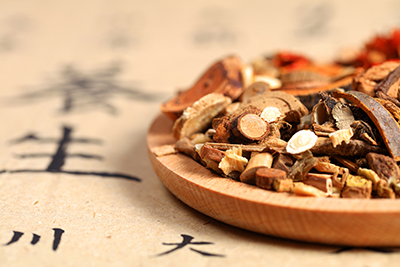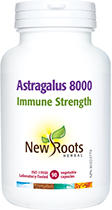Astragalus: A tonic for the immune system
Astragalus (Astragalus membranaceous) is a highly regarded herb belonging to the plant family Fabaceae and has a rich tradition of use within both Western herbalism and traditional Chinese medicine (TCM). Astragalus is best known as an immune modulator and Yin tonic. Astragalus has been studied for use in a variety of conditions, including asthma and allergy, kidney disease, cancer, diabetes, and heart disease. Clinically, astragalus is often utilized as an immune modulator in the prevention of upper respiratory tract infections during the winter months.
Activity
Astragalus contains a variety of constituents including flavonoids, saponins, and polysaccharides.[1][2] Astragalus extract and its constituent astragalosides have been shown to exert antioxidant and anti-inflammatory properties, protecting brain tissue from damage, protecting mitochondria in various tissues including kidneys, and suppressing proinflammatory cytokine signaling, including in the lungs (NF-κB).[2]
With respect to immune function, astragalus has been shown to increase subsets of immune cells in healthy patients, including neutrophils, lymphocytes, and monocytes, and has been shown to increase T- and B-cell proliferation.[2]
In TCM, astraglus is considered a tonic for the spleen and lung meridians. Astragalus also strengthens Qi or vital energy, treats stagnant blood flow, and “improves Yin deficiency by promoting diuresis to remove edema due to inadequate transformation of dampness and Qi.”[2]
In modern scientific research, astragalus has been studied for a range of conditions affecting the respiratory system, kidneys, heart, and the immune system.[3][4][5] For instance, studies have shown that supplementation with astragalus can be helpful for asthma, allergy, lung cancer, chronic kidney disease, diabetes, heart failure, and fatigue.[6][7][8][9][10][11][12] In China, astragalus is used as an injectable preparation as well as in an extract for oral use.[11][13]
Allergy and Asthma
Astragalus has been shown to modify immune function in allergy and asthma. In a study of 90 children with asthma in remission, astragalus was compared to inhaled corticosteroids for preventing new asthma flares.[8] Results showed that the effectiveness rates in preventing asthma recurrence were similar for astragalus (66%) and corticosteroids (73%, p > 0.05); however, interestingly, children receiving combined treatment had significantly higher effectiveness than either treatment alone, at 96% (p < 0.05). In a randomized, double-blind trial of 48 adult patients with a moderate to severe seasonal allergic rhinitis, use of astragalus for six weeks significantly reduced rhinitis compared to placebo.[10]
Kidney Disease
A multicentre prospective trial of 32 patients with stage 3 or 4 chronic kidney disease evaluated the effects of a herbal formula containing astragalus and Angelica sinensis.[5] Herbal treatment was associated with improved kidney function in 78% of patients. Serum creatinine decreased 12%, eGFR increased 21%, and albumin increased 2.7% compared to baseline.[5]
Cancer
Astragalus has been studied in patients undergoing treatment for lung cancer and colorectal cancer and has been shown to improve appetite, immune parameters, survival measures, and tumour response as well as side effects from chemotherapy including neutropenia (immune suppression), nausea and vomiting, and neuropathy.[6][14][15] A systematic review and meta analysis of 65 RCTs including 4,751 patients with non–small-cell lung cancer (NSCLC) found that astragalus given alongside platinum-based chemotherapy in comparison with chemo alone evaluated cancer treatment outcomes.[6] A meta-analysis of 20 of these trials (n = 1,520) found a 35% reduced risk of death at 12 months associated with astragalus treatment.[6] Another meta-analysis of 57 trials showed a 35% increased rate of having a tumour response to chemotherapy associated with astragalus treatment.[6]
 A meta-analysis of 13 randomized controlled trials evaluated TCM herbs (most commonly astragalus) in combination with FOLFOX4 chemotherapy in patients with advanced colorectal cancer.[14] The most frequently used herbs were Astragalus membranaceus, Panax ginseng, Atractylodes, Poria, Coix lachryma-jobi, and Sophora flavescens. Researchers found that the addition of herbal medicines improved tumour response rate by 25%, one-year survival by 51%, and quality of life.[14] Treatment with herbal medicine also lowered side effects from chemotherapy including neutropenia, nausea and vomiting, and neuropathy, compared to FOLFOX4 alone.[14]
A meta-analysis of 13 randomized controlled trials evaluated TCM herbs (most commonly astragalus) in combination with FOLFOX4 chemotherapy in patients with advanced colorectal cancer.[14] The most frequently used herbs were Astragalus membranaceus, Panax ginseng, Atractylodes, Poria, Coix lachryma-jobi, and Sophora flavescens. Researchers found that the addition of herbal medicines improved tumour response rate by 25%, one-year survival by 51%, and quality of life.[14] Treatment with herbal medicine also lowered side effects from chemotherapy including neutropenia, nausea and vomiting, and neuropathy, compared to FOLFOX4 alone.[14]
Diabetes
In patients with type 2 diabetes, astragalus has been shown to prevent diabetic kidney damage,[7] and it has been shown in a meta-analysis to improve glycemic control.[11] A meta-analysis of 13 studies including 1,054 participants with type 2 diabetes investigated the effect of astragalus supplementation.[11] Astragalus supplementation reduced fasting glucose (0.83 points) and postprandial glucose, fasting insulin, HOMA-IR (insulin resistance), and hemoglobin A1C (1.7 points) compared to the control group.[11]
Heart Disease
In a randomized trial, 90 patients with congestive heart failure (CHF) were randomized to treatment with an ACE inhibitor (perindopril) medication plus high-, moderate-, or low-dose astragalus.[12] High dose was equivalent to 7.5 g, moderate was equivalent to 4.5 g, and low dose was equivalent to 2.25 g twice daily for 30 days. Results demonstrated a dose-dependent improvement in left ventricular ejection fraction (LVEF), a measure of the heart’s pumping ability, and patients’ walking distance.[12] LVEF improved 59% in the high-dose group.
These data demonstrate the extent to which astragalus have been scientifically investigated in both Chinese studies as well as Western studies. Astragalus demonstrates a high safety profile as it has been well tolerated in combination with a variety of potent medications including chemotherapy and cardiovascular medications. Astragalus has demonstrated effectiveness in a range of conditions including allergy and asthma, kidney disease, diabetes, heart disease, and cancer.
Individuals taking medications should consult with a licensed health-care provider to assess whether supplementation with astragalus is appropriate.
References
- Bratkov, V.M., et al. “Flavonoids from the genus Astragalus: Phytochemistry and biological activity.” Pharmacognosy Reviews, Vol. 10, No. 19 (2016): 11–32.
- Gong, A.G.W., et al. “Evaluation of the pharmaceutical properties and value of Astragali radix.” Medicines, Vol. 5, No. 2 (2018). pii: E46.
- Ji, L., et al. “Astragalus membranaceus up-regulate Cosmc expression and reverse IgA dys-glycosylation in IgA nephropathy.” BMC Complementary and Alternative Medicine, Vol. 14 (2014): 195.
- Li, N.Y., et al. “Astragalus membranaceus improving asymptomatic left ventricular diastolic dysfunction in postmenopausal hypertensive women with metabolic syndrome: A prospective, open-labeled, randomized controlled trial.” Chinese Medical Journal, Vol. 131, No. 5 (2018): 516–526.
- Li, S., et al. “[Therapeutic effect of Astragalus and Angelica mixture on the renal function and TCM syndrome factors in treating stage 3 and 4 chronic kidney disease patients]” (article in Chinese). Zhongguo Zhong Xi Yi Jie He Za Zhi, Vol. 34, No. 7 (2014): 780–785.
- Dugoua, J.J., et al. “Astragalus-containing Chinese herbal combinations for advanced non-small-cell lung cancer: A meta-analysis of 65 clinical trials enrolling 4751 patients.” Lung Cancer, Vol. 1 (2010): 85–100.
- Liao, H., et al. “Are the therapeutic effects of Huangqi (Astragalus membranaceus) on diabetic nephropathy correlated with its regulation of macrophage iNOS activity?” Journal of Immunology Research, Vol. 2017 (2017): 3780572.
- Lin, Y., B. Wang, and X.Q. Luo. “[Clinical study of astragalus's preventing the recurrence of asthma in children]” (article in Chinese). Zhongguo Zhong Xi Yi Jie He Za Zhi, Vol. 31, No. 8 (2011): 1090–1092.
- Liu, C.H., et al. “Effects of the traditional Chinese herb Astragalus membranaceus in patients with poststroke fatigue: A double-blind, randomized, controlled preliminary study.” Journal of Ethnopharmacology, Vol. 194 (2016): 954–962.
- Matkovic, Z., et al. “Efficacy and safety of Astragalus membranaceus in the treatment of patients with seasonal allergic rhinitis.” Phytotherapy Research, Vol. 24, No. 2 (2010): 175–181.
- Tian, H., et al. “The effect of Astragalus as an adjuvant treatment in type 2 diabetes mellitus: A (preliminary) meta-analysis.” Journal of Ethnopharmacology, Vol. 191 (2016): 206–215.
- Yang, Q.Y., S. Lu, and H.R. Sun. “Clinical effect of Astragalus granule of different dosages on quality of life in patients with chronic heart failure.” Chinese Journal of Integrative Medicine, Vol. 17, No. 2 (2011): 146–149.
- Guo, L., et al. “Astragalus polysaccharide injection integrated with vinorelbine and cisplatin for patients with advanced non-small cell lung cancer: Effects on quality of life and survival.” Medical Oncology, Vol. 29, No. 3 (2012): 1656–1662.
- Chen, M., et al. “FOLFOX 4 combined with herbal medicine for advanced colorectal cancer: A systematic review.” Phytotherapy Research, Vol. 28, No. 7 (2014): 976–991.
- Lee, J.J., and J.J. Lee. “A phase II study of an herbal decoction that includes Astragali radix for cancer-associated anorexia in patients with advanced cancer.” Integrative Cancer Therapies, Vol. 9, No. 1 (2010): 24–31.

 Stores
Stores


